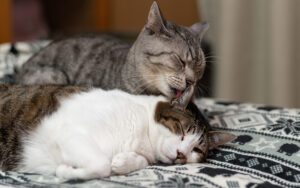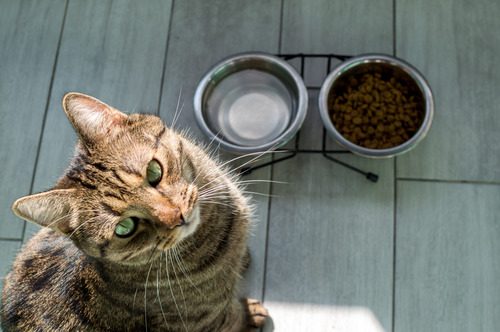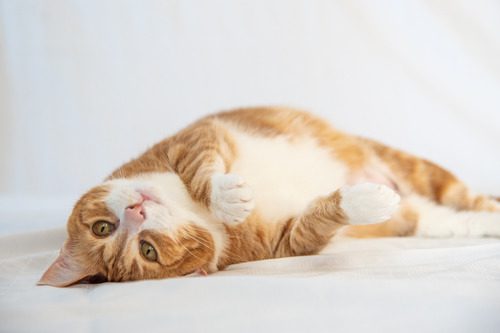The Intricate Art of Feline Bonding: Why Do Cats Lick Each Other and What It Means for Their Health?
Welcome to another insightful article from the experts at Companion Animal Hospital of Wakefield, where we celebrate the unique traits and behaviors that make our feline friends so endearing. Today, we delve into an intriguing aspect of feline behavior: Why do cats lick each other?

Cats and Allogrooming: An Overview
The Mystery of Allogrooming
Allogrooming, or social grooming, is a behavior often observed in various animal species, and it’s particularly pronounced in the feline world. But what is allogrooming? It refers to the act of one individual grooming another. Among cats, this behavior is commonly seen as one cat licking another, which can seem strange to us humans.
Understanding Allogrooming: Why Do Cats Lick Each Other?
Cats are meticulous self-groomers. However, there are spots they cannot reach, such as the head and neck. Allogrooming allows them to groom these hard-to-reach areas. Moreover, allogrooming serves several functions beyond hygiene.
The Psychology of Allogrooming
Building Bonds: The Social Aspects of Allogrooming
One of the primary functions of allogrooming is to establish and reinforce social bonds between cats. By grooming each other, cats show their affection and trust. This bond-forming ritual is typically seen among cats who share a close relationship.
Allogrooming and the Cat Hierarchy
Allogrooming also plays a crucial role in establishing and maintaining social hierarchies within a group of cats. The cat that is groomed often tends to be the dominant one. By allowing a fellow cat to groom it, the dominant cat asserts its superior position.
Allogrooming and Cat Health
Benefits of Allogrooming
Beyond the social aspects, allogrooming provides tangible health benefits. It helps remove loose fur, dirt, and parasites, and it distributes oils along the fur, keeping the coat healthy and shiny. Additionally, the act of grooming can be soothing and stress-relieving for cats.
When Licking Becomes Excessive: Identifying Problems
However, as with anything, too much of a good thing can become a problem. If you notice excessive grooming to the point of causing bald patches or skin irritation, it’s essential to seek veterinary advice. Excessive grooming could be a sign of stress, skin issues, or underlying health problems.
How We Can Help at Companion Animal Hospital of Wakefield
At Companion Animal Hospital of Wakefield, we are passionate about understanding and promoting the health and well-being of your feline companions. If youhave any concerns about your cat’s grooming habits, behaviors, or overall health, our team is ready to assist.
Our veterinary professionals are skilled at identifying and addressing a wide range of feline health issues, including those related to grooming behaviors. With a comprehensive range of diagnostic tools and a deep understanding of feline behavior and health, we offer the best care for your beloved pets.
Don’t hesitate to reach out to us if you notice any changes in your cat’s grooming habits or if you simply want to learn more about their behavior. You can call us at (919) 488-5300 or conveniently book an appointment online at https://wakefieldpetvet.com/.
At Companion Animal Hospital of Wakefield, we’re more than just a veterinary practice; we’re a community. We believe in creating a space where pet owners can learn, share, and receive outstanding care for their pets. And as part of our commitment to your pet’s health, we’ll continue to provide insights into understanding your pet’s behavior and what it means for their health.
Allogrooming or cats licking each other is a fascinating and complex behavior that serves various purposes from social bonding, hierarchy establishment, to health maintenance. However, balance is key, and excessive licking can indicate potential problems.
As a responsible pet parent, it’s important to understand these behaviors and keep an eye out for any changes. Trust Companion Animal Hospital of Wakefield to provide the expertise and care your furry friends need to lead a happy, healthy life.
Recent Posts

Parasites in Dog’s Stool: Signs and Treatments

Why Is my Cat Not Drinking Water?

Common Causes of Eye Trauma in Dogs
About Us
At Companion Animal Hospital of Wakefield, our veterinarians in Raleigh, NC, provide better care for your pets. As members of your family, cats and dogs deserve the highest level of medicine with the most compassion. That’s why we put a strong emphasis on personalized care for your pet and client education for you. We believe that when we take the time to help you thoroughly understand your pet’s health, we’re able to make the best decisions for their care together.


